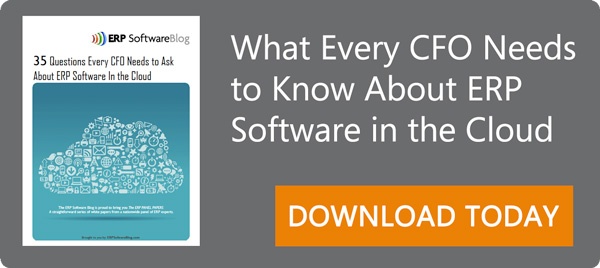With more organizations embracing cloud computing as the best way to deliver superior customer value at lower costs, things are changing fast for both ERP developers and users. According to industry watchers, further acceptance of cloud-based ERP solutions will give rise to at least eight trends expected to drive the future of cloud ERP.

Eight Trends Of Cloud ERP
- More industry-specific solutions. Providing advanced functionality and enough room for expansion without additional budget allocation, recently developed cloud-based ERP solutions are able to support horizontal and vertical growth. Less money spent not only means lower costs, a competitive pricing edge, and a higher profit margin, but also frees up funds to devote to various growth initiatives. Further, some ERP systems (e.g. Microsoft Dynamics AX and GP) give the enterprises operating within particular sectors, once overlooked by ERP developers, the opportunity to select custom functionality according to their needs.
- Midmarket will drive cloud ERP adoption. According to analysts, SMBs are more likely than large organizations to dictate the future of cloud ERP. While large enterprises with complex IT systems may find it very difficult to adjust to new ERP software apps, smaller organizations can easily change their infrastructures to fit the software.
- More versatile services. Another emerging trend is the two-tier ERP model, which allows organizations to keep some of their features on-premise, while adding more tools to the cloud. Two-tier ERP deployments are not only ready to offer organizations functionality according to very specific requirements, they also give leaders accurate, real-time information for better decision making regarding sudden changes in sales, inventory, budgeting, and customer volumes. For all these reasons, two-tier ERP models are required by many organizations considering cloud computing adoption.
- Additional time and cost benefits. Facilitating the completion of a wide range of operations according to preset settings, cloud-based ERP solutions give companies a lot more flexibility, allowing them to save time and money. Also, these solutions require less time and money to be spent on maintenance, which translates to higher profits.
- Vendor lock-in: a re-emerging trend? If not too long ago cloud ERP vendors used to attract customers with freedom from proprietary lock-in, vendor lock-in reappears, making ERP users totally dependent on their vendors for using certain products and services. Since switching from one vendor to another will incur substantial costs, vendor lock-in is expected to prevent new vendors from entering the ERP market, which may result in monopolistic competition.
- Increased demand for mobility. As ERP developers have seen an increased appetite for next generation ERP systems, they’re currently focusing on developing new mobile ERP apps, meant not only to promote particular enterprise trends, such as BYOD and BYOC, but also to attract millennials -- a new generation of employees eager to use the latest software infrastructures, which inherently involve the cloud.
- More informed users. Creating quite a buzz, cloud ERP has attracted attention, stirring curiosity and inviting potential buyers to look for more details. Fortunately, most ERP vendors provide complete information about the solutions they provide, helping business owners make informed decisions regarding the future of their companies.
- Superior functionality. The features included in cloud-based ERP software can be used in tandem with mobile devices to perform different tasks and oversee business operations even when users are on the other side of the globe. Thanks to the unparalleled managerial flexibility and freedom of movement provided by cloud ERP, the collective participant groups are expected to expand more in the future, which will lead to further ERP development and more benefits for users.
Most ERP components have already been moved to the cloud and integrated with new features for advanced functionality. Hence, many organizations around the world have decided to deploy their financials, human resources, supply chains, and customer management on public, private, or hybrid clouds.
However, there is one more reason why an increasing number of enterprises have a keen interest in cloud ERP. As economic and regulatory pressures increase, resources are used up at a faster pace, skilled workers are fewer than ever before, and customers are becoming more and more demanding. Cloud-based ERP software delivers one of the few viable options an organization can use to expand locally or globally with minimal risk.
 The Eight Trends Driving The Future Of Cloud ERP">
The Eight Trends Driving The Future Of Cloud ERP">
